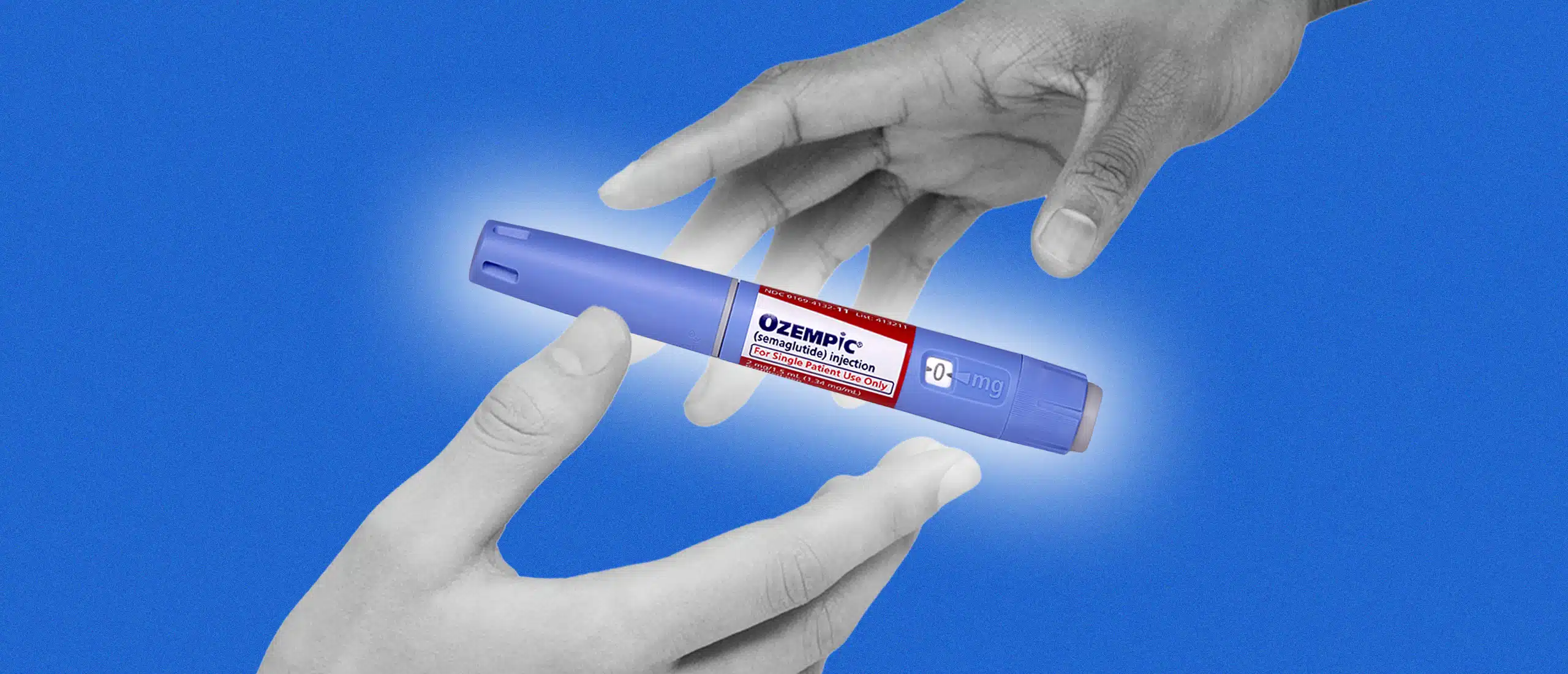Scientists May Have Accidentally Invented a Do-It-All Longevity Drug
Sometimes the best inventions—like potato chips and penicillin—are the product of a happy accident. This might be the case for semaglutide. New research suggests the wildly popular medication Ozempic might have health benefits that extend far beyond diabetes management and weight loss.
Semaglutide (frequently referenced by brand names Ozempic and Wegovy) belongs to a group of drugs called GLP-1 receptor antagonists. It works by mimicking the hormone GLP-, which helps regulate blood sugar in diabetes patients. The appetite and digestion-suppressing side effects have made Ozempic appealing to patients who want to curb cravings and lose weight.
Scientists are now exploring other off-label uses for the popular drug, like reducing heart disease risk and curbing addiction. And the results are promising.
Potential Benefits of Semaglutide
Reduce heart disease risk
New research presented at the 2023 European Congress on Obesity found that Wegovy may reduce the risk for heart disease, since obesity is a major risk factor for cardiac issues (1).
Patients who took a weekly Wegovy injection were surveyed by the Mayo Clinic using a standardized survey of heart risk (2). Most practitioners use the risk calculator developed by the American College of Cardiology, which uses factors like blood pressure and cholesterol to estimate a 10-year risk.
Wegovy users reported a 18 percent decline in 10-year heart disease risk. It’s worth noting that this study looked at patients in the real world so it lacked a control group of non-Wegovy users.
Novo Nordisk (the pharmaceutical company that makes Wegovy) recently announced the results of a double-blind clinical trial investigating the effects of Wegovy on 17,500 obese patients with no prior history of diabetes. The study found that Wegovy cut the risk of cardiovascular events—like stroke and heart attack—in obese patients by 20 percent.
Treat addiction
Semaglutide helps patients lose weight by curbing food cravings and reducing appetite. But the drug may be able to help people stave off cravings for other substances, like drugs and alcohol.
Several weight-loss patients told The Atlantic that after taking semaglutide injections, they “lost all interest” in other addictions like shopping, alcohol, and smoking. Some reported that their other self-soothing habits, like nail biting, completely disappeared as well.
While the science hasn’t quite caught up with these anecdotal claims, research has found other GLP-1 receptor antagonists successful in mitigating addiction in rodents. Cocaine-addicted lab rats sought out the drug less after being given four doses of a GLP-1 receptor antagonist in a 2018 study (3). Another found reported similar results on rats addicted to oxycodone that were given the same GLP-1 receptor antagonist (4).
GLP-1 receptor antagonists, like semaglutide, modify your brain’s reward center by regulating dopamine transporter activity (5), the same system involved in addiction.
This is enough to get scientists interested in semaglutide as an addiction treatment. Two ongoing clinical trials at the University of North Carolina, Chapel Hill intend to test if semaglutide could help treat nicotine and alcohol addictions.
Fight cancer
Semaglutide may boost immunity by improving the function of “natural killer” immune cells. Unlike other immune cells, natural killer cells don’t need prior exposure to an infected or invading cell—like cancer—in order to attack.
Being overweight can disrupt the normal function of natural killer cells, which may heighten cancer risk in obese individuals (6).
Scientists at Maynooth University followed 20 obese patients who took semaglutide once a week (7). After six months, participants’ natural killer cell function appeared to improve, independent of weight loss.
Prevent dementia
Age is the greatest risk factor for dementia and Alzheimer’s, but obesity and type 2 diabetes also skyrocket your chances of getting this debilitating disease (8).
Alzheimer’s is called “type three diabetes” in some research circles. This is because APOE4—the gene thought to be partially responsible for Alzheimer’s—may make it harder for your brain to use insulin. This causes your brain cells to essentially “starve and die,” according to the Mayo Clinic.
Type 2 diabetes patients using semaglutide were found to have a lower instance of dementia, according to a 2022 study (9). Vascular dementia—a form that is caused by limited blood supply to the brain—is most commonly associated with type 2 diabetes patients (10). This means that semaglutide may be better at protecting against certain forms of the disease.
Novo Nordisk is funding multiple clinical trials to investigate the effects of semaglutide on dementia risk, with results expected in 2026.
Weight gain can be a sign of low testosterone. Hone’s hormone assessment is the simplest way to uncover whether your levels are low. It’s fast, simple, and you can do it from home.
References
-
Powell-Wiley, et al (2021). Obesity and Cardiovascular Disease: A Scientific Statement From the American Heart Association.
-
Craig (2023). Cardiovascular risk score decreases after one year of semaglutide use in obese patients, study shows.
-
Hernandez, et al (2018). Glucagon-like peptide-1 receptor activation in the ventral tegmental area attenuates cocaine seeking in rats.
-
Zhang, et al (2019). Activation of GLP-1 receptors attenuates oxycodone taking and seeking without compromising the antinociceptive effects of oxycodone in rats.
-
Jensen, et al (2020). Glucagon-like peptide-1 receptor regulation of basal dopamine transporter activity is species-dependent.
-
O’Shea, et al (2019). Dysregulation of Natural Killer Cells in Obesity.
-
Barra, et al (2023). Glucagon-like peptide-1 therapy in people with obesity restores natural killer cell metabolism and effector function.
-
Tanti (2022). The Role of Obesity and Diabetes in Dementia.
-
Norgaard, et al (2022). Treatment with glucagon-like peptide-1 receptor agonists and incidence of dementia: Data from pooled double-blind randomized controlled trials and nationwide disease and prescription registers.
-
Celis-Morales, et al (2022). Type 2 Diabetes, Glycemic Control, and Their Association With Dementia and Its Major Subtypes: Findings From the Swedish National Diabetes Register.













